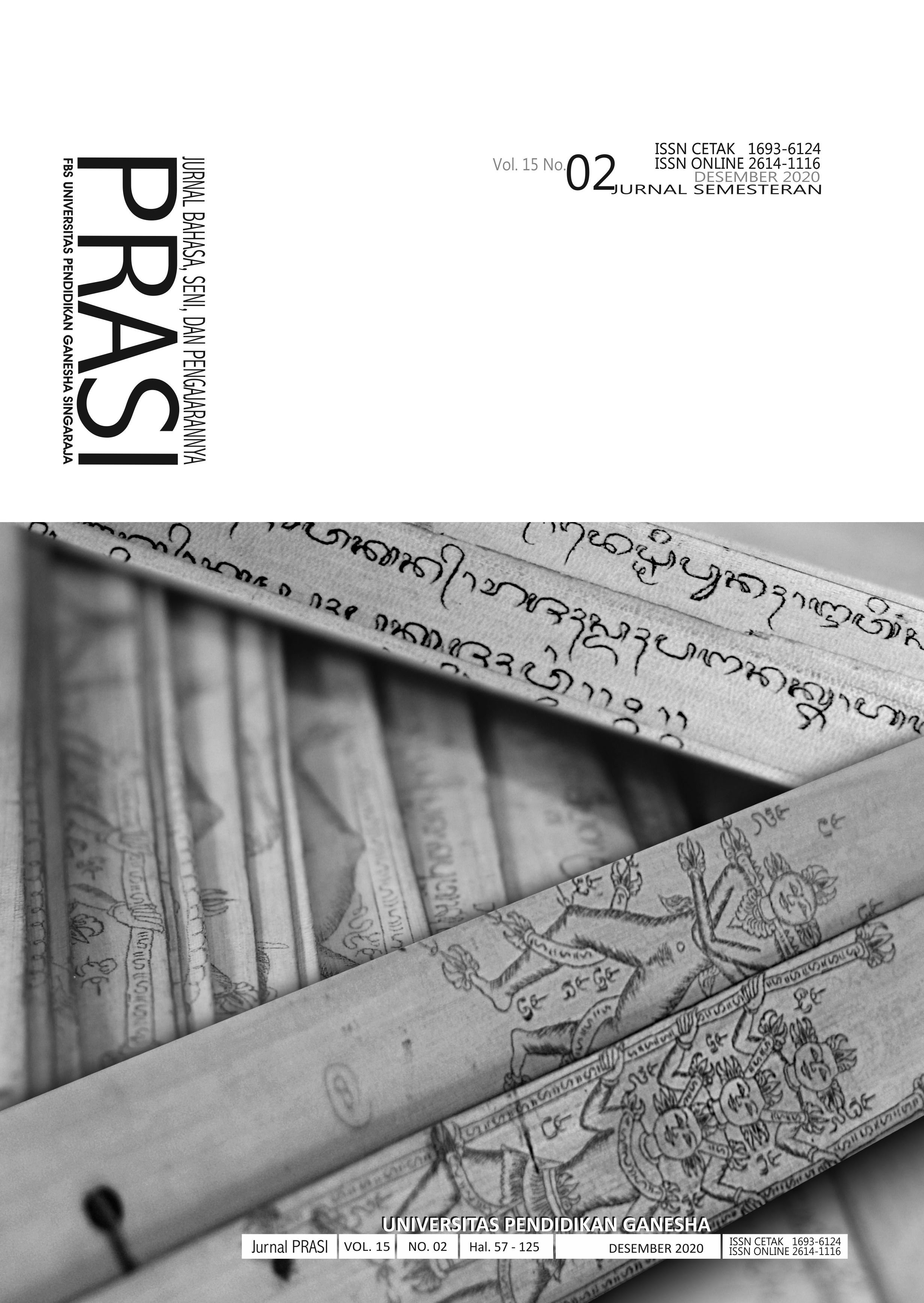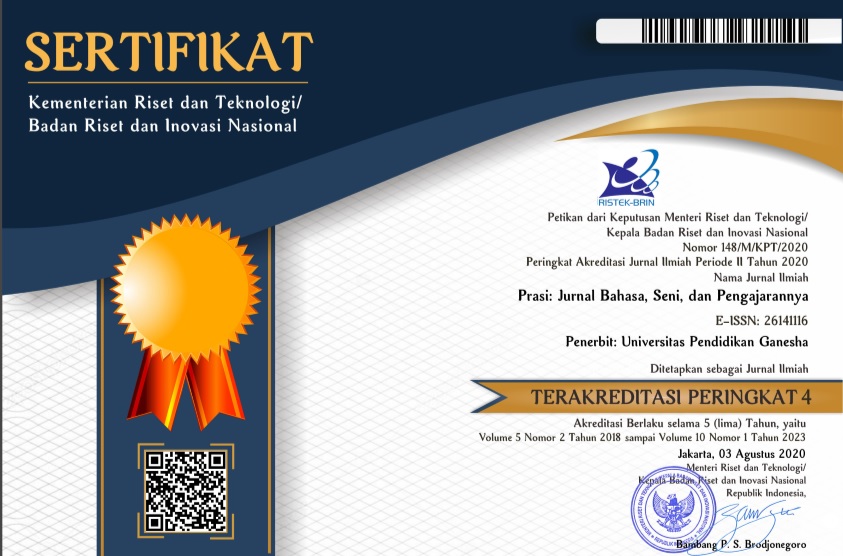IMPLEMENTASI PEMBELAJARAN ONLINE BERBASIS EDMODO DALAM SITUASI PANDEMIK COVID-19 UNTUK MATERI KEPENDIDIKAN PADA PRODI PENDIDIKAN SENI PERTUNJUKAN
DOI:
https://doi.org/10.23887/prasi.v15i02.29758Keywords:
edmodo, online learning, art learning, performing art.Abstract
The COVID-19 pandemic has brought significant and spontaneous changes to the realm of education, including learning performing arts in higher education. Face-to-face learning in the classroom was replaced by online learning. Teachers need to explore online learning applications to provide learning facilities at home. This paper presents a discussion regarding Edmodo-based online classroom implementation as a tool for distance learning. The implementation has been carried out on performing arts pedagogy courses, namely Curriculum & Instruction, Classroom Management, Instructional Technology, and Art's Learning Evaluation, in performing art education study programs. From the results of implementing the Edmodo, it is known that most students could pass courses based on their final grades. This implementation is an example of setting online design on the subject of other performing arts pedagogy.References
Al-Naibi, I., Al-Jabri, M., & Al-Kalbani, I. (2018). Promoting Students’ Paragraph Writing Using Edmodo: An Action Research. TOJET: The Turkish Online Journal of Educational Technology, 17(1), 130–143. Retrieved from https://files.eric.ed.gov/fulltext/EJ1165773.pdf
Alsmari, N. A. (2019). Fostering EFL Students’ Paragraph Writing Using Edmodo. English Language Teaching, 12(10), 44–54. https://doi.org/10.5539/elt.v12n10p44
Charoenwet, S., & Christensen, A. (2016). The Effect of Edmodo Learning Network on Students’ Perception, Self-Regulated Learning Behaviors and Learning Performance. Proceedings of The 10th International Multi-Conference on Society, Cybernetics and Informatics 2016, (July), 297–300. Retrieved from http://www.iiis.org/CDs2016/CD2016Summer/papers/EA948HG.pdf
Durak, G. (2017). Using Social Learning Networks (SLNs) in Higher Education: Edmodo Through the Lenses of Academics. International Review of Research in Open and Distributed Learning, 18(1), 84–109. https://doi.org/10.19173/irrodl.v18i1.2623
Hidayati, N., Pangestuti, A. A., & Prayitno, T. A. (2019). Edmodo Mobile: Developing e-Module on Biology Cell for Online Learning Community. Biosfer: Jurnal Pendidikan Biologi, 12(1), 94–108. https://doi.org/10.21009/biosferjpb.v12n1.94-108
Inel-Ekici, D. (2017). The Use Of Edmodo In Creating An Online Learning Community Of Practice For Learning To Teach Science. Malaysian Online Journal of Educational Sciences, 5(2), 91–106. Retrieved from https://eric.ed.gov/?id=EJ1142512
Insani, H. N., Suherdi, D., & Gustine, G. G. (2018). Undergraduate Students’ Perspectives In Using Edmodo As An Educational Social Network. English Review: Journal of English Education, 6(2), 61–68. https://doi.org/10.25134/erjee.v6i2.1254
Kemendikbud, Republik Indonesia. (2020). Mendikbud Terbitkan SE tentang Pelaksanaan Pendidikan dalam Masa Darurat Covid-19. Retrieved from Kemendikbud RI website: https://www.kemdikbud.go.id/main/blog/2020/03/mendikbud-terbitkan-se-tentang-pelaksanaan-pendidikan-dalam-masa-darurat-covid19 diakses tanggal 6 Mei 2020, pukul 13.00
Khanchandani, K. P., Chachra, S. D., & Naiksatam, A. (2019). A Comparative Study on Interactive Digital Classrooms: Edmodo and Google. Proceedings - IEEE 10th International Conference on Technology for Education 2019, 205–209. https://doi.org/10.1109/T4E.2019.00046
Khodary, M. M. (2017). Edmodo Use to Develop Saudi EFL Students ’ Self-Directed Learning. English Language Teaching, 10(2), 123–135. https://doi.org/10.5539/elt.v10n2p123
Mokhtar, F. A. (2018). Breaking Barriers Through Edmodo : A Qualitative Approach on the Perceptions of University of Malaya Undergraduates. Online Learning, 22(1), 61–80. https://doi.org/10.24059/olj.v22i1.1026
Pratama, U. N. (2020). Analisis Gaya Belajar Mahasiswa Pendidikan Seni Pertunjukan Berdasarkan Modalitas Preferensi Sensori. JINOTEP Jurnal Inovasi Teknologi Pembelajaran, 7(2), 107–115. https://doi.org/10.17977/um031v7i22020p107
Rulviana, V. (2018). Implementasi Media Edmodo dalam Mata Kuliah Pengembangan Kurikulum Sekolah Dasar. Jurnal Refleksi Edukatika, 8(2), 205–208. https://doi.org/10.24176/re.v8i2.2361
Ryane, I., & El Faddouli, N. (2020). A Case Study of Using Edmodo to Enhance Computer Science Learning for Engineering Students. International Journal of Emerging Technologies in Learning, 15(3), 62–73. https://doi.org/10.3991/ijet.v15i03.11252
Wichadee, S. (2017). A Development of the Blended Learning Model Using Edmodo for Maximizing Students ’ Oral Proficiency and Motivation. International Journal of Emerging Technologies in Learning, 12(2), 137–154. https://doi.org/10.3991/ijet.v12i02.6324
Yunkul, E., & Cankaya, S. (2017). Students’ Attitudes Towards Edmodo, A Social Learning Network: A Scale Development STUDY. Turkish Online Journal of Distance Education, 18(April), 16–29. https://doi.org/10.17718/TOJDE.306554
Downloads
Published
Issue
Section
License
Authors who publish with Prasi agree to the following terms:- Authors retain copyright and grant the journal the right of first publication with the work simultaneously licensed under a Creative Commons Attribution License (CC BY-SA 4.0) that allows others to share the work with an acknowledgment of the work's authorship and initial publication in this journal
- Authors are able to enter into separate, additional contractual arrangements for the non-exclusive distribution of the journal's published version of the work (e.g., post it to an institutional repository or publish it in a book), with an acknowledgment of its initial publication in this journal.
- Authors are permitted and encouraged to post their work online (e.g., in institutional repositories or on their website) prior to and during the submission process, as it can lead to productive exchanges, as well as earlier and greater citation of published work. (See The Effect of Open Access)


.png)
.png)









